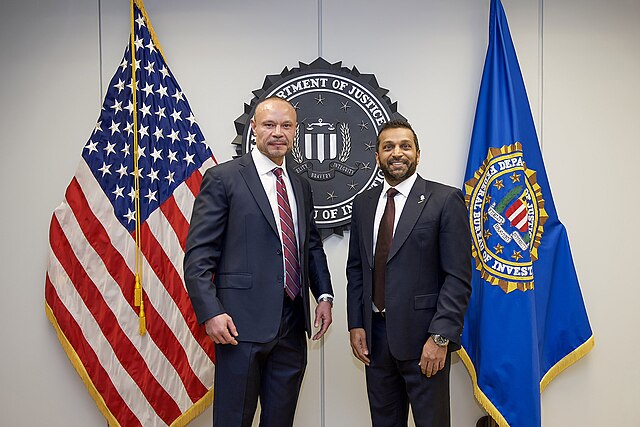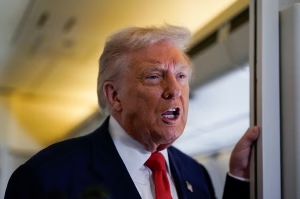The FBI’s nationwide crime crackdown is continuing at full force, with federal officials reporting tens of thousands of arrests made since President Donald Trump returned to office. The administration says the surge in enforcement reflects a renewed commitment to tackling violent crime, dismantling criminal networks, and restoring public safety after years of rising concerns about lawlessness in major American cities.
President Trump publicly praised the FBI’s progress in a detailed Truth Social post on Oct. 20, highlighting a wide range of arrests and seizures that he said demonstrate the administration’s dedication to reasserting federal authority in crime-ridden regions.
“Since January 20th, more than 28,000 violent criminals have been arrested,” Trump wrote. He described the figure as “record breaking,” adding that the FBI under Director Kash Patel and his senior deputies Dan Bongino and Andrew Bailey has “done an incredible job” executing the administration’s law-and-order strategy.
Trump also touted the seizure of “over 6,000 illegal weapons,” the arrest of 1,700 alleged child predators, the removal of 300 individuals accused of human trafficking crimes, and the rescue of more than 5,000 children from dangerous environments as part of a sweeping federal effort.
“These are historic results,” Trump wrote. “We are bringing law and order back to America.”
Operation Summer Heat: A Central Enforcement Pillar
According to the administration, one of the most impactful programs launched this year is Operation Summer Heat, a multi-agency initiative that ran from June through September. The operation deployed federal agents to major metro areas to apprehend what officials described as “the most violent and dangerous offenders.”
Last month, Trump and FBI Director Patel jointly announced that Operation Summer Heat led to more than 8,700 arrests of violent criminals. According to the administration, these included individuals wanted in connection with homicides, armed robberies, sexual assaults, and gang-related activities.
The administration also said that approximately 11,000 homicide suspects were taken into custody nationwide—including repeat offenders wanted for multiple killings—though officials have not clarified how this number overlaps with other arrest figures.
Cities such as New Orleans, St. Louis, Baltimore, and Nashville reportedly saw arrest spikes of up to 250 percent compared to previous years. Federal officials attributed the rise not to an increase in crime but to a concentrated effort to pursue individuals who had long evaded capture.
Trump described the results as evidence of a decisive shift in public safety:
“The summer of 2025 was the safest and most peaceful summer in two decades.”
He credited the FBI, the Department of Justice, the Department of Homeland Security, and the newly renamed Department of War for coordinating the crackdown.
Administration Says Violent Crime Fell 20 Percent Over 2024
Beyond arrest totals, Trump pointed to a 20 percent decline in violent crime nationwide compared to the same period in 2024. The administration attributes the reduction to aggressive federal involvement, expanded funding for enforcement operations, and the deployment of National Guard units to cities experiencing persistent violence.
Federal officials argue that the steep decline shows that strict enforcement measures—combined with pressure on local jurisdictions to cooperate with federal agencies—are reversing crime trends that they say worsened under the previous administration.
Trump framed the decline as the beginning of a long-term national safety program:
“Every American deserves to live in a community where they’re not afraid of being mugged, murdered, robbed, raped, assaulted, or shot.”
Democrats Blast Crime Crackdown as Federal Overreach
While the administration has celebrated the results, Democratic lawmakers have sharply criticized both the methods and the legal basis of the expanded crime crackdown.
Several Democratic senators, led by Sen. Alex Padilla (D-Calif.), issued a joint statement warning that Trump’s deployment of federal forces—including National Guard units—to major cities was “extralegal” and a dangerous expansion of presidential authority.
The senators accused Trump of “fabricating claims of chaos” to justify the deployments and claimed the administration had “defunded” local police by reducing federal grants for community-level law enforcement programs.
Their statement warned:
“These illegal deployments risk pushing the boundaries of executive power beyond their breaking point.”
The administration dismissed these accusations, arguing that Democrats have opposed nearly every major enforcement action and, in the White House’s view, contributed to the environment that allowed violent crime to grow.
Targeting Criminal Noncitizens: DHS Reports Nearly Half a Million Arrests
In addition to domestic crime enforcement, the administration is aggressively pursuing individuals in the country illegally, particularly those with criminal histories.
On Oct. 20, Homeland Security Secretary Kristi Noem said in a post on X that federal immigration authorities have arrested over 480,000 criminal noncitizens during a nine-month stretch. She said about 70 percent of the suspects had documented criminal convictions or pending charges.
Noem described the results as “extraordinary” and credited new federal mandates that allow ICE and other agencies to conduct more expansive operations in cities that previously restricted federal immigration enforcement.
These numbers reflect a substantial shift in federal immigration policy, with significantly faster processing, more arrests under expedited removal, and broader cooperation between DHS and the FBI.
Operation River Wall: Securing the Southern Border
Alongside domestic crime crackdowns, DHS has launched Operation River Wall, a border security initiative focused on strengthening enforcement along the Rio Grande. According to DHS, the campaign is intended to:
-
deter illegal crossings
-
disrupt narcotics smuggling routes
-
dismantle human trafficking networks
-
increase federal presence along key border corridors
Operation River Wall includes expanded river patrol units, increased surveillance assets, unmanned aerial systems, and direct cooperation with local Texas authorities.
DHS officials say the goal is not only to prevent illegal entry but also to identify and intercept criminal activity tied to cartels, smuggling organizations, and transnational gangs.
Trump: “We’re Not Slowing Down”
Despite political pushback, Trump has signaled that the federal crime crackdown will continue at full speed through 2026.
In a recent speech, he told supporters that the FBI and other agencies will “keep going until the job is done,” and that the administration has requested additional funding to scale operations further.
Federal officials say that upcoming initiatives will focus on:
-
Organized retail theft groups
-
Fentanyl trafficking rings
-
Fugitive sex offenders
-
Carjacking networks operating across state lines
-
Illegal firearms distribution
The administration has also indicated that additional joint operations with local law enforcement will be announced in early 2026.
The Road Ahead: Intensified Enforcement and a Political Fight
Federal officials argue that the U.S. is experiencing a major decline in violent crime, one they attribute to aggressive federal policy and unprecedented cross-agency coordination.
Democrats argue the administration is overstating the threat of violence, exploiting public safety concerns, and using federal force in ways that challenge constitutional norms.
Trump’s supporters say the political backlash is predictable and rooted in partisan opposition rather than public safety concerns.
With more operations planned, more immigration enforcement underway, and new border security expansions being deployed, the conflict over how to fight crime—and who has authority to do it—appears far from over.

James Jenkins is a celebrated Pulitzer Prize-winning author whose work has reshaped the way readers think about social justice and human rights in America. Raised in Atlanta, Georgia, James grew up in a community that instilled in him both resilience and a strong sense of responsibility toward others. After studying political science and creative writing at Howard University, he worked as a journalist covering civil rights issues before dedicating himself fully to fiction. His novels are known for their sharp, empathetic portraits of marginalized communities and for weaving personal stories with broader political realities. Jenkins’s breakout novel, Shadows of Freedom, won national acclaim for its unflinching look at systemic inequality, while his more recent works explore themes of identity, resilience, and the fight for dignity in the face of oppression. Beyond his novels, James is an active public speaker, lecturing at universities and participating in nonprofit initiatives that support literacy and community empowerment. He believes that storytelling is a way to preserve history and inspire change. When not writing, James enjoys jazz music, mentoring young writers, and traveling with his family to explore cultures and stories around the world.









